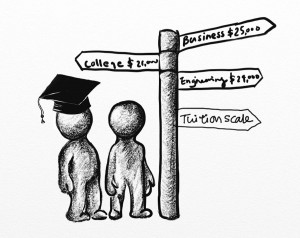Flat-rate tuition offers best options
In today’s economy, student debt has become a critical concern, often having a remarkable influence on a student’s academic path.
As students become increasingly desperate to cut back on tuition costs, the concept of every student paying equal tuition has been called into question. Many question the fairness of a flat tuition policy when a university’s total tuition money — like USC’s — is not divided evenly across all schools and majors. Instead, more money is unfairly allocated to majors that require higher levels of investment.
Academic programs with high budget costs — particularly those in technical and medical fields — have become modern scapegoats for rising tuition costs and expenditures, unfairly blamed for forcing all students to support programs that might be considered more prestigious and require more funding.
A recent study by the Cornell Higher Education Research Institute found that 29 percent of bachelor’s degree institutions use a variable tuition structure. Among the most common practices used in such a model is scaling tuition costs based on students’ majors. Under this system, fields of study such as business, engineering and nursing see higher tuition costs than less technical majors like narrative studies or psychology.
The concept of variable tuition can be easy to support, as its implementation would aim to fairly charge students only for the academic services they use. Putting such a model into practice, however, would result in more negative consequences than positive benefits.
First and foremost, USC’s vast variety of academic minors and electives make it almost impossible to put a finite value on the cost of a certain degree.
Additionally, variable tuition models dissuade students from following their passions and instead encourage them to pursue degrees based on their economic feasibility.
Not only does this prevent students from reaching their full learning potential, but it also strips universities of their status as “the great equalizers,” instead creating a system where privileged students have more opportunities to succeed in their learning than students from less fortunate backgrounds.
We cannot allow college education to assume a hierarchical structure under which certain sectors of higher education are only accessible to a limited selection of the student body.
Rather than implement variable college tuition, universities should instead invest more heavily in lower-cost programs and encourage cross-educational studies through minors, general education and elective programs. This way, all students can feel as though they are benefiting from top-tier professors and resources.
Though charging a flat-rate tuition to all students might not appear to be the fairest option, implementing a variable tuition model can only be detrimental to our university and its mission as an academic institution, as well as our intellectual mission as students.
Students should utilize the many opportunities that USC offers for cross-degree studies and interdisciplinary exploration to benefit from the money allocated to these programs. The small amount of money saved under a variable tuition model is nowhere near worth the cost of producing a generation of students who fail to reach their full potential because of financial restrictions.
Ryan Townsend is a sophomore majoring in business administration. His column “The Blame Game” runs Tuesdays.


Ryan, education is no different then any other commodity you purchase. Certain brands costs more because presumably you get more or because the value is such it is worth the higher cost to the buyer. Your proposal seems to say education and academia needs to adopt an artificial communistic policy that requires students wanting to study poetry or sculpture to pay the same tuition that medical and law students pay. Our society is taking too far a self entitled stand where we decry so many things ae not fair – including our own investment in ourselves. This also makes flip flopping majors too whimsical and superfiscal. Once you finish your four years in school you will discover many things are not seemingly fair. That is part of being an adult.